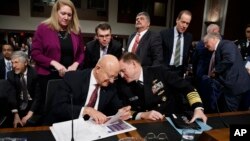Republican Rep. Paul Ryan was among those piling on when President Barack Obama came under fire several years ago for reading some of his daily intelligence briefings, rather than receiving them in-person.
"I have a hard time comprehending that, because the primary job of the commander in chief is to keep the country safe," Ryan said in an October 2014 interview on Fox News Channel. "And you need to get from your intelligence community, your defense community — especially when we have troops in harm's way— what's going on."
Yet now, as President-elect Donald Trump refuses daily intelligence briefings, questions U.S. spy agency conclusions about Russia interfering in the 2016 presidential election, praises Russian President Vladimir Putin and appears to side with WikiLeaks founder Julian Assange, Ryan and other Republicans have Trump's back. Far from strongly defending the U.S. intelligence community, they're siding with the new leader of their party, even when he makes comments or takes stances that would seem anathema to the GOP.
It's a remarkable turnabout for a political party that cheered President Ronald Reagan's hard-line stance against the "evil empire" of the Soviet Union, unfailingly supports the military and joined with European allies in blistering Putin after Russia's annexation of Crimea in 2014.
Asked at a press briefing Thursday whether he had full confidence in U.S. intelligence agencies, now-Speaker Ryan offered a tepid endorsement that began and ended on a note of criticism.
"Well, they don't always get everything right. We've seen that clearly," Ryan said. "But I do have faith that our men and women in our intelligence community are doing an incredible job, sacrificing for our country. But there's always room for improvement."
Earlier Thursday, in an interview with WTAQ radio in Wisconsin, Ryan passed up the chance to distance himself from Trump's elevation of Assange in a tweet earlier this week, when Trump cited Assange's claim that Russia had not been the source of Democratic Party documents that WikiLeaks revealed.
Instead, even while criticizing Assange, Ryan defended Trump, saying that what the president-elect is "rightfully concerned about is partisans are trying to use the Russian hacking incident to ... call into question the legitimacy of his victory."
And Ryan endorsed Trump's claim, disputed by intelligence officials, that intelligence leaders had delayed a briefing for Trump on the hacking issue that is set to take place later Friday. In dismissing the intelligence on Russia, Trump highlighted a glaring intelligence failure — the claims that Saddam Hussein had weapons of mass destruction in Iraq in the lead-up to the 2003 invasion and war.
With a couple of exceptions — most notably Sens. John McCain of Arizona and Lindsey Graham of South Carolina — other GOP lawmakers and leaders have also stayed largely quiet as Trump lauds Putin and derides U.S. intelligence.
During a hearing Thursday with intelligence agency officials on the alleged Russian election meddling, Republicans on the panel largely avoided making comments that would contradict Trump's well-publicized skepticism that Russia had anything to do with hacking Democratic emails. The exceptions were McCain and Graham.
Republican Sen. Tom Cotton of Arkansas even appeared to try to build the case for Trump, ticking off several Trump proposals, from increasing defense spending to accelerating nuclear weapons modernization, to challenge the notion that Putin would favor Trump over Hillary Clinton.
"There is some contrary evidence, despite what the media speculates, that perhaps Donald Trump is not the best candidate for Russia," Cotton argued.
The hearing provoked an angry outburst from Democratic Sen. Claire McCaskill of Missouri.
"The notion that the soon elected leader of this country would put Julian Assange on a pedestal compared to the men and women of the intelligence community and the military ... no matter whether you're a Republican or a Democrat, there should be howls," McCaskill said. "And mark my word, if the roles were reversed, there would be howls from the Republican side."
In most cases, Republicans haven't actually embraced Trump's stances, they've just declined to call him out on them, noted Gary Schmitt, a resident scholar at the American Enterprise Institute who worked as a Democratic Hill staffer before serving as executive director on the Foreign Intelligence Advisory Board during Reagan's second term.
"It's a normal situation in which the nominal head of your party, you don't want him to be undercut," Schmitt said. "But my view is if it looks like the substance is clearly on the side of the intelligence community, you're not doing anybody any favors by protecting him."




